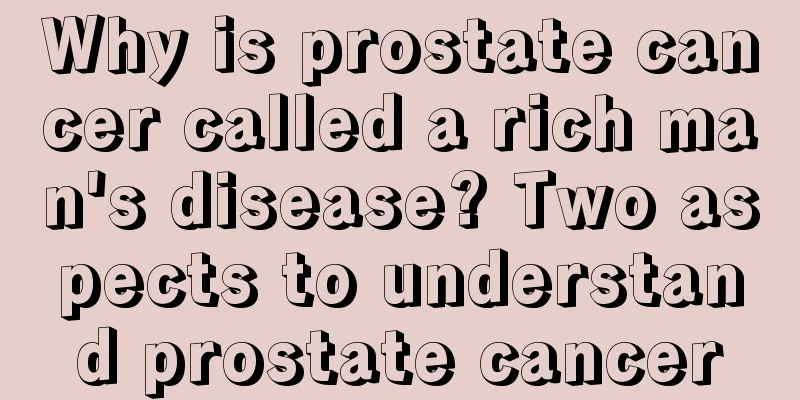Who are the people susceptible to prostate cancer

|
In modern society, more and more diseases are being discovered, and people are trying to find cures or relief methods. The incidence of cancer is also on the rise, among which prostate cancer is the most common malignant tumor of the male reproductive system and ranks second in male cancer deaths. So, who is prone to prostate cancer? Prostate cancer not only reduces the quality of life, but also threatens life. When facing prostate cancer, early prevention is the top priority, and 7 types of men should pay special attention. 1. Those with obvious masculine characteristics Many urologists have found in clinical practice that men with more obvious male characteristics, such as more luxuriant hair, more developed male organs, and more vigorous energy, are more likely to be on the operating table for prostate cancer. Abstinence or indulgence may affect the balance of hormones in the body. It is very important to have a healthy sexual life habit, which cannot be uncontrolled or excessive. Many people are concerned about whether Viagra can cause prostate cancer. Viagra is not an aphrodisiac and theoretically will not cause prostate cancer. 2. Older people Prostate cancer is an old age disease. The older you are, the higher the chance of getting cancer. The older men are, the more they need to pay attention to their prostate health. 3. People with irregular lifestyles Japan conducted a follow-up survey from 1988 to 1997 to explore the relationship between working hours and the incidence of prostate cancer. Among all the men surveyed, 12,756 worked long-term day shifts, 1,184 worked long-term night shifts, and another 1,966 worked day and night shifts. In the follow-up study, 55 men were eventually diagnosed with prostate cancer, including 38 who worked day shifts with a prevalence of 0.3%; 6 who worked night shifts with a prevalence of 0.5%; and 11 who worked day and night shifts with a prevalence of 0.55%. The researchers studied the patients' family history of prostate cancer and age and regional differences. The final results showed that men who work day and night shifts are 3.5 times more likely to develop prostate cancer than men who work long-term day shifts. There is almost no difference in the risk of men who work long-term night shifts and men who work day shifts. Irregular work and life cause the body's biological clock to be disrupted and hormone levels to be unstable, which is the reason for being more susceptible to prostate cancer. 4. People who eat meat without restraint Excessive intake of animal fat, red meat, especially grilled meat, may be one of the reasons for the increased incidence of prostate cancer. As for whether eating too much spicy food or hot pot can cause prostate cancer, there is no direct relationship between the two. 5. Obese people A very important cause of prostate cancer is the disorder of sex hormone levels. Obesity can easily lead to problems such as androgen deficiency, so fat men may be more susceptible to prostate cancer. 6. Bald people Some bald men are more likely to develop prostate cancer. This is because hair loss may be caused by testosterone levels. The risk of prostate cancer may be related to testosterone levels, and this hidden danger is manifested in the hair. 7. Those whose father or brother suffers from this cancer Men with a family history of prostate cancer have a higher risk of developing the disease than men without a family history. Studies have shown that if one of the fathers or brothers has had prostate cancer, the chance of developing prostate cancer is 1 times higher than the general population; if two immediate family members have prostate cancer, the chance of developing cancer can increase 3 times. The above seven types of men are carefully sorted out as the group that is prone to prostate cancer. If male friends meet the above types, it is best to correct them in time or have regular checkups to avoid prostate cancer. The earlier the prostate cancer is treated, the better. Although it can be treated in the late stage, the chance of death is greatly increased. |
<<: How to treat the late stage of prostate cancer after endocrine therapy
>>: How to cure prostate cancer in its early stages
Recommend
How to effectively treat ingrown toenail paronychia
Ingrown toenail paronychia can occur in the nail ...
What tests should be done when nasopharyngeal cancer is suspected
Sometimes, we also have some symptoms similar to ...
What should I do if I have chloasma on my face?
If you have chloasma on your face, you should pay...
How to treat parasympathetic neurasthenia
Parasympathetic neurasthenia has a great impact o...
What does hepatitis B anti-HBE positive mean
Normally people do not have a good understanding ...
What are the effects of low thyroid stimulating hormone on the fetus?
Low thyroid-stimulating hormone is a common pheno...
How long does lung cancer lurk in the body before it breaks out?
How long does lung cancer remain dormant in the b...
Is the mid-term cure rate of lymphoma high?
Many people are afraid of cancer and think that a...
The 36 most effective lessons about habits
Changing habits is one of the most fundamental sk...
What medicine should I take for loose and sticky stool in the toilet
Since the advent of toilets in modern society, to...
How many types of onychomycosis are there
Onychomycosis is a relatively common nail disease...
What is the cause of gallstones?
Gallstones are a relatively common disease with a...
Where is the hospital that treats colorectal cancer
A good hospital can really help us solve some of ...
Can I get pregnant in the early stage of gastric cancer?
The incidence of gastric cancer is now higher, an...
Why does my throat feel blocked after taking diet pills?
In modern life, losing weight is a matter of conc...









